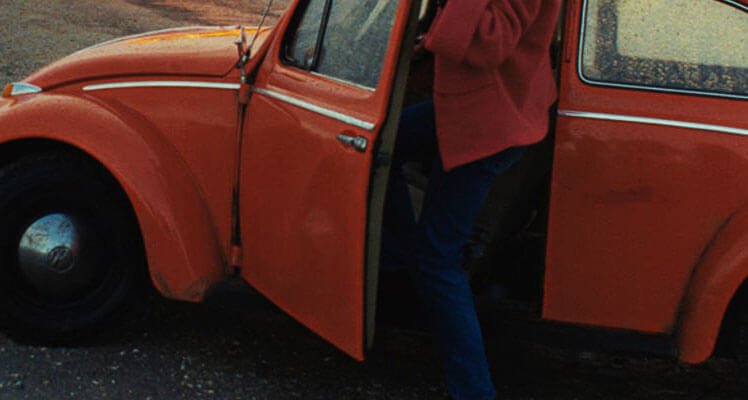Cynthia Cruz
Five Poems
- Preface
- Coma
- Fragment
- The Language
- Refrain

Preface
In the German film in which
I play the blonde daughter
of the protestant, turned militant.
In black vinyl micro mini,
butter colored Fogal stockings,
cream t-shirt, and small glass
buttons stitched along the top left shoulder.
In an early scene, before the oft-quoted
quote: “I like cars too, I like all the great things
you can buy in a department store.
But when you have to buy them in order to stay
unaware, comatose, then the price you pay
is too high.” Before prison, before
Stammheim, before isolation, and the cryptic
letters between myself and the others,
before death and the cell,
before walking away, willingly,
from everything.
Coma
I wish I had had my camera
at the moment of collapse,
when it all happened. The beginning,
of the end of everything.
When my mind became
erased and the world murmured
to me in its strange animal
like language. The haloing in the room
of the in-between, and the steady hum
of nothing. I was horizontal
when it hit me. When I blacked out
on the doctor’s examination bed.
When I went out, when the world dropped
and fell away like a moon
moving too fast or the black sun
when it comes. when it smolders.
Then the nurse, her face, too close,
before me, her small hands.
One with ice on the nape
of my neck, the other
like a lover’s, on my face.
Her eyes, looking into mine.
The doctor, I don't know
when, he pressed the invisible
button, summoning her. And, asks,
Are you breathing, can you breath.
And love came into me, then,
another ventilation, an atmosphere..
And it was then, in that small
blank moment, that smear or dot
of coma, that I was brought back
when I left everything
I knew and loved, behind me.
Fragment
In the black and white film still,
in which my eyes are closed.
It is morning in the East
and what I thought might happen
was an apparition.
In the scene in which you leave,
and I spend the rest of the film
blindly trying to find you.
Knowing nothing, finding nothing.
I am thinking over everything I thought
I believed. Its small particles,
its vast rooms of exquisite but broken pieces.
In the film clip in which I am lost,
wandering through the endless
black and white screens of the city.
The Language
Silent and smoldering, the language
and only reason for my being here,
I said to Sabine the last time I saw her.
Present the worst, the most
embarrassing work, she said.
Then add stronger work around it.
Remember, she said, you are an empty
vessel. And intense, you feel everything.
too much. I have been practicing, now,
presenting the most humiliating.
Without context, with no explanation.
Allowing the world to create its own
conclusion. It is terrifying, and I am afraid
what the world will do. But also
it is a kind of abyss. An ending.
Eva Hesse, when she returned
to Germany with her husband,
realized he did not see her.
She had a breakthrough then,
when walking, she saw the remnants
of that culture: plastic and metal
wire, glass and other forms of what
others consider/ed waste and garbage.
And she began to work with these
terrible materials and chemicals.
Present the worst, the weakest,
most powerfully vulnerable work.
Life doesn't last; art doesn’t last.
It doesn’t matter, Hesse said later,
near her death, in an interview.
What matters is the trace. Silent,
the willingly weak and near-
incoherent language, inside.
Refrain
In the one scene cut from the film
with blonde Nina Hoss, the one in which
she is arrested and sent to her East
German prison of village near the sea.
On weekends, she meets her fiancé, in secret.
He arrives in the woods in a gold
Mercedes, bringing stockings
and chocolate, cigarettes and magazines.
And nights in a hotel near the sea.
Traveling, I am sometimes beautiful
but also alone and with music.
On the train to Dresden I carried
her red cosmetics case with cassettes
and records, plastic satchels of tinctures,
hypnotics and the fractured
remnants of medicine. You are
the most beautiful, Adam said,
but also wild, part animal and stupid.
After classes, near the Pacific, for hours
and with music.
Cynthia Cruz
Cynthia Cruz is the author of four collections of poetry: Ruin (2006), The Glimmering Room (2012), Wunderkammer (2014), and How the End Begins (2016). Her fifth collection of poems, Dregs, is forthcoming in 2018 along with a collection of essays, Notes Toward a New Language, exploring silence and marginalization. Cruz has received fellowships from Yaddo and the MacDowell Colony as well as a Hodder Fellowship from Princeton University. She has an MFA from Sarah Lawrence College in writing and an MFA in Art Criticism & Writing from the School of Visual Arts. Cruz is currently pursuing a PhD in German Studies at Rutgers University. She teaches at Sarah Lawrence College.